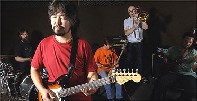|
It all started in a small room behind the teacher's toilet, deep in Siberia, at a  school in Tuva, the smallest and most remote republic in the Russian federation. Not this jam, you understand, but the musical journey of Albert Kuvezin, leader of the group Yat-Kha. school in Tuva, the smallest and most remote republic in the Russian federation. Not this jam, you understand, but the musical journey of Albert Kuvezin, leader of the group Yat-Kha."Our teacher said, 'If you want to clean the room, you can use it.' We were so happy! We had some old equipment and we started copying Russian underground bands. All our friends loved it. There was no other possibility to listen to such music for us then. On the road, between gigs in Exeter and Brighton, Yat-Kha have added a stop in the journey to let me be in the band for an afternoon. In the studios around us are a very heavy-metal band going into meltdown, a drummer who sounds as if he is playing a machine gun along to Robbie Williams, and someone singing Blondie's Heart of Glass. As Yat-Kha set up their equipment, Albert, singer and guitarist, does a little mincing dance: "Maybe I should cover this tune. I'd need a wig." Once you've heard his voice, you get the joke. The effect of his style of Tuvan "throat singing" (or kanzat), said Mojo magazine, is such that the listener "will feel like some natural catastrophe is imminent". Blondie, as sung by an earthquake. Yat-Kha has, however, covered many rock and pop tunes on its most recent album, Re-Covers, including tracks by Motörhead, Led Zeppelin and Kraftwerk. Equipment set up, we have a go at a song from the album, Joy Division's Love Will Tear Us Apart. I forget to play for quite a while, stopped in my tracks by the voice. The sound is sometimes funny, too. Does it bother him that some people will laugh? "When I started singing in this voice, in the Soviet Union, it was a lot worse. The idea of a socialist-communist ideology was that Russian brother was big brother. All other peoples, nations and tribes in the Soviet Union were little brothers. Especially those that lived in Siberia - small population, living in forests or mountains. They thought of them as wild aboriginal people, who know nothing of civilisation and culture. Even today most Russians have that idea. When I first played in big concert halls, people would start laughing. It was really hard work. Sometimes they shouted, 'Go back to Tundra!' or 'Yellow arse!' or 'Thin eyes!' Or they threw coins and cans." The abuse didn't stop there. The events of the year before Re-Covers read like a grim thriller: the three-day journeys from Tuva, to the airport in Moscow, before a tour can even begin; deportation from Hungary after passports were stolen; hassles from mobsters and government officials, and finally a car crash and a stay in hospital for Albert. This is a man used to fighting for his art. "Sometimes I wonder, myself, what kind of music has impressed me. As a child I watched TV in Tuva. We had only one main channel, and they played a lot of ethnic music. In the west, world music is big now, but I remember when I was a schoolboy I liked a lot of music from around the world. The Soviet Union supported countries in Africa and Asia, especially those who wanted to be socialist, so students in Russia played a lot of different music. I remember I liked Cuban music very much, and Indian music." We play some more: a traditional tune, Amby Baryp, from the Tuva Rock album, and pentatonic improvisations that get faster and faster. I am trying desperately to keep up towards the end. It reminds me of the Woody Allen sketch: "My father used to play the tuba as a young man - he tried to play Flight of the Bumblebee and blew his liver out through the horn." "I remember my first cassette was Suzi Quatro," says Albert. "Then later somebody gave me Boney M - I was so impressed by the arrangements, especially the bass line. When my mother bought me a seven-string Russian-style guitar, I started to try and play the bass lines from Boney M and Suzi Quatro. I didn't even know the bass guitar existed." Another band member, Sholban Mongush, sings and plays igil (or horsehead fiddle) - a frail-looking, twostringed instrument that sits on his knee. It is plugged into the kinds of pedals you see electric guitarists using in rock bands. The image seems to sum up Yat-Kha's dual roots, traditional and modern. "Later at school there was a kind of club - a propaganda place. They were called palaces of culture. The state paid, and people could study singing, dancing - even playing in a band. I got a place in a young band to play guitar. I didn't like it because you had to play all these songs about the Soviet Union, about happy times and the future of socialism and Lenin. Of course, some songs were about love - but towards your country and village. "I could have been Captain Beefheart or Tom Waits, if I'd been born in America," says Albert with a grin, as we pack up. With a voice like his, he has to be one of very few people who could get away with saying that. 'Re-Covers' is out now. The band play St George's Hall, Bristol, on October 20.
|
|
